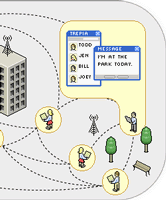| Saturday, May 10, 2003 |
| France |
 I'm still planning on moving. Mid-July. To somewhere in South Western France. Don't know exactly where, but around Toulouse somewhere. I'm still planning on moving. Mid-July. To somewhere in South Western France. Don't know exactly where, but around Toulouse somewhere.
It is a big deal to just move to another continent, of course. Its a hassle to move in the first place, but going to a different and new country with a different culture, different norms, different language - it's quite an adventure. And a family of five people, including teenagers, all with a mind of their own - that's a bit more involved than it was when we came to the U.S. from Denmark 18 years ago, just two young people and a little baby. I have a bookshelf full of books about living in France. I'm frantically working on improving my French. More people are popping up with helpful hints and connections of various kinds. I'm sure it will all work out. [ Diary | 2003-05-10 01:17 | 17 comments | PermaLink ] More > |
| WiFi buddy lists |
 SmartMobs: SmartMobs:Trepia provides a new smartmobbing tool: access a location-based list of other nearby WiFi users. It's not available for Mac yet: please contact Trepia to ask them to accelerate Mac development.(Via Emergent Report)That could be good not just for talking, but for an ad hoc economy. Values change when an instant transaction is available is possible in places where it otherwise wasn't. If I'm in the airport and I realize I can't bring that pound of foie gras with me on the plane, I could find somebody else who wants it in a jiffy.On the surface, Trepia looks similar to a buddy list. While programs like ICQ and AIM will show you a static list of friends, Trepia shows you a list of people who are currently in your area -- people who you most likely didn't know before! You can check out their profile and picture and strike up a conversation, knowing that if you actually want to meet them, they are never more than a few minutes away. [ Technology | 2003-05-10 14:40 | 2 comments | PermaLink ] More > |
| Weblog APIs |
I still haven't gotten around to finish writing a program interface to this newslog program, but I've better pay attention to what is going on in that field. For the uninitiated a "weblog API" is the standardized way any program can interface with a weblog. With that in place, you might post to your weblog from an assortment of different programs, and it becomes easier to transfer postings or quoted excerpts from one place to the other. When I first looked at the Blogger API and the MetaWeblog API, I was sort of puzzled that they only seemed to do part of what I'd want, and were of no help with the more advanced features. Anyway, here is good overview of what is going on, Weblog APIs: Stating the obvious:Something's buzzing online about weblog APIs. Someone posted a comparison between the Blogger and the MetaWeblog API on his weblog. Then Dave Winer is getting pretty riled up about Google's plans to develop a new version of Blogger API, which should better be based on the MetaWeblog API instead.Sounds like the MovableType version is what I'd want to pay most attention to. [ Programming | 2003-05-10 15:06 | 2 comments | PermaLink ] More > |
| Contact Networks |
| Recently I've accepted invites to LinkedIn, Ryze, Friendster and probably other networking sites I'm forgetting. Stuart Henshall has some excellent commentary on experiences with these. And it also reminds me, of course, that I have my own contact networking site, NCN, and I went and looked at my own contact list. And, regardless of what kind of nice features it is surrounded with, I must admit that it suffers from some of the same problems that any of these schemes will suffer from. All of them require that one signs up into a central database, and fills in one's profile from scratch, and then one has some way of adding new contacts to one's network. Unfortunately that only works really well if the networks happens to be so super popular that *everybody* is using it.
When I look at my own NCN contact list of 216 people, it has some nice features, quite competitive with the other guys. But most of the people on the list haven't logged into the network for a long time, so their information isn't particularly up-to-date. 3 of them are dead. It is not a big wonder. The network has existed for 8 years, and of course the close to 8000 people who have signed up are not going to sign in every day, unless there is something mind-blowing going on that doesn't happen anywhere else. So, at any given time, maybe a hundred people or two are paying attention on a very regular basis. What would change it would either be if most of that kind of networking sites and directories of people would work together and share and aggregate information, OR, if one's public persona isn't stored on multiple island databases, but on one's own computer. I can't really go around remembering all the places I've signed up. Really makes the most sense if I maintain my own version of who I am on my own machine, or at least in one particular place I've chosen to be authoritative. But what about all the relationship info? What other people have to say about me. What level of data-sharing friendlyness they choose to extend to me. It shouldn't be too hard to work out a scheme where this might be stored redundantly both with my data and with theirs. I make a comment about you, it gets stored in my file for you, pointing to your site for the details of who you are. My machine would also ping your machine and let it know that I said something in relation to you, and your machine would have the opportunity of grabbing a copy of it. Is FOAF - Friend of a Friend - something that is suitable for this? I don't really understand it well enough yet. [ Technology | 2003-05-10 21:39 | 4 comments | PermaLink ] More > |
| The Interplanetary Internet |
SmartMobs:This article from SPACE.com about the Interplanetary Internet (IPN) is not science fiction. Rich Gray reports it is becoming a reality.I can't wait to get an ICQ message from Mars. Not that I know anybody on Mars.The IPN would form a backbone connecting a series of hubs on or around planets, ships, and at other points in space. These hubs would provide high-capacity, high-availability Internet traffic over distances that could stretch up to hundreds of millions of miles.Gray adds that all the planets and satellites in our solar system have already Internet addresses and that NASA is already communicating with its earth-orbiting missions through its internal Deep Space Network. The rest of us will have to wait until at least 2005 when IPN-equipped satellites are launched [ Technology | 2003-05-10 22:07 | 0 comments | PermaLink ] |